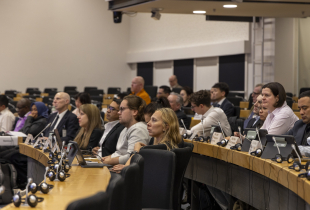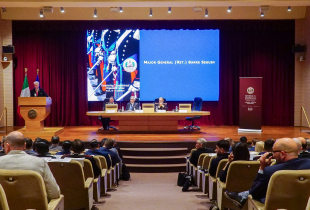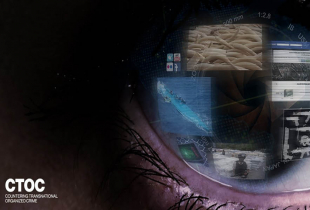
Countering Transnational Organized Crime on an International Stage
The Countering Transnational Organized Crime International Forum wrapped up their last session of a three-day event in Rome, Italy, that brought together 58 participants from 10 countries on 3 continents. Organized by the George C. Marshall European Center for Security Studies and hosted at the Italian Carabinieri Officers College, CTOC-IF examined the challenges of government executives and policy makers to counter transnational organized crime and offered solutions to address common transnational challenges.
The forum was kicked off with opening remarks by Marshall Center Director retired Maj. Gen. Barre Seguin, Carabinieri Officers College Commandant Maj. Gen. Claudio Domizi, and Deputy Commanding General of the Italian Carabinieri Corps, Lt. Gen. Muarizio Detalmo Mezzavilla, who stressed how the interconnected world provided new opportunities for criminals to operate and how transnational organized criminal groups were changing and adapting their tactics. The sentiment was echoed by the opening speaker, Lt. Gen. Antonino Maggiore, Director, DCSA – Joint National Anti-Drugs Agency.
“A partial attack on an organization by focusing on one country is not efficient. We need to cooperate,” said Maggiore, highlighting how international responses are important to countering trafficking networks.
Col. Paolo Storoni, Head of the Anti-Mafia Investigation Division, III Department of International Relations for Investigative Purposes, spoke on the mechanisms of international cooperation on joint investigations with international partners. He stressed that they had 800 arrests out of 124 cases investigated collaboratively with other nations resulting in the defeat of 17 organizations and the seizure of 180 million Euros.
Scott Olcott, Director of the U.S. Drug Enforcement Administration National Lab provided insights on illicit drugs and trends across the globe, focusing on the fentanyl challenge and how the deadly drug became an epidemic across the United States. Olcott highlighted DEA’s priorities to counter the drug challenge in the U.S. and shared the recent trends of various illicit drugs in the market, as well as efforts to counter drug availability. Col. Alessandro Cavalli, DCSA – Joint National Anti-Drugs Agency spoke about the Italian anti-drug efforts and highlighted the coordination mechanisms across the agencies to conduct effective drug operations in Italy.
Additional topics explored at the forum included sanctions against organized criminal entities, corruption as a critical enabler, agromafia and a comparison of Italian and U.S. perspectives of trends, challenges and lessons learned in countering transnational organized crime.
Marshall Center Deputy Dean Ralf Roloff concluded the event stressing the importance of international cooperation and how and why CTOC-IF has been designed as a forum to allow different countries to exchange experiences and establish connections to counter organized crime. “TOC is not only a threat that should be left to law enforcement and judicial authorities, but it has become a significant geopolitical threat that requires a transnational response.”
The George C. Marshall Center for Security Studies, founded on June 5, 1993, is a renowned international security and defense studies institute. A bilateral partnership between the U.S. and Germany, it is a lasting cooperation that promotes dialogue and understanding among the nations of North America, Europe and Eurasia. In 2023, the Marshall Center marks its 30th anniversary, re-emphasizing its commitment to carrying Marshall’s vision, an enduring legacy that continues through the security education initiatives of the Center.


